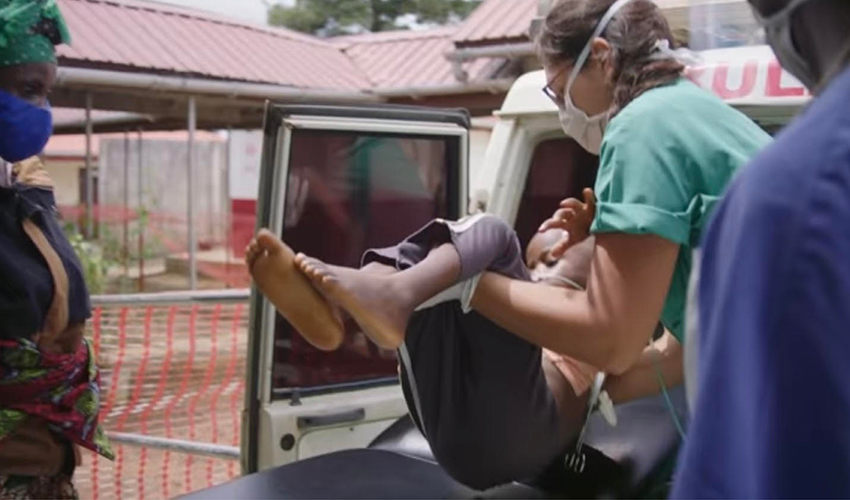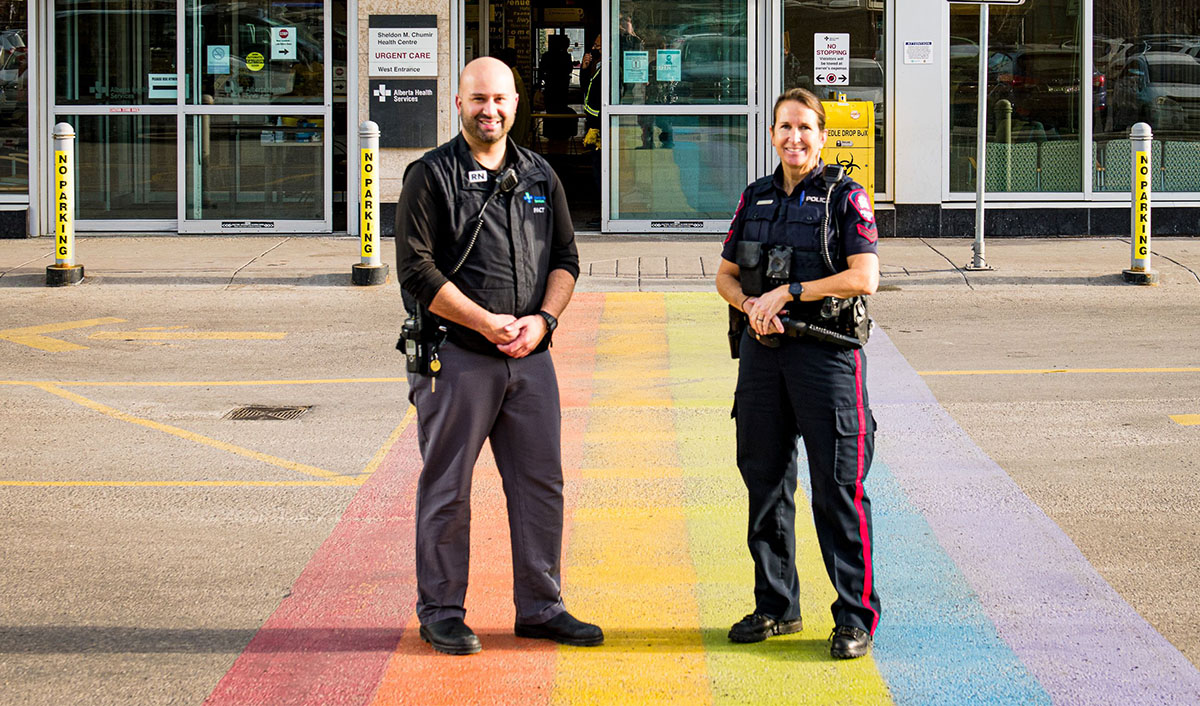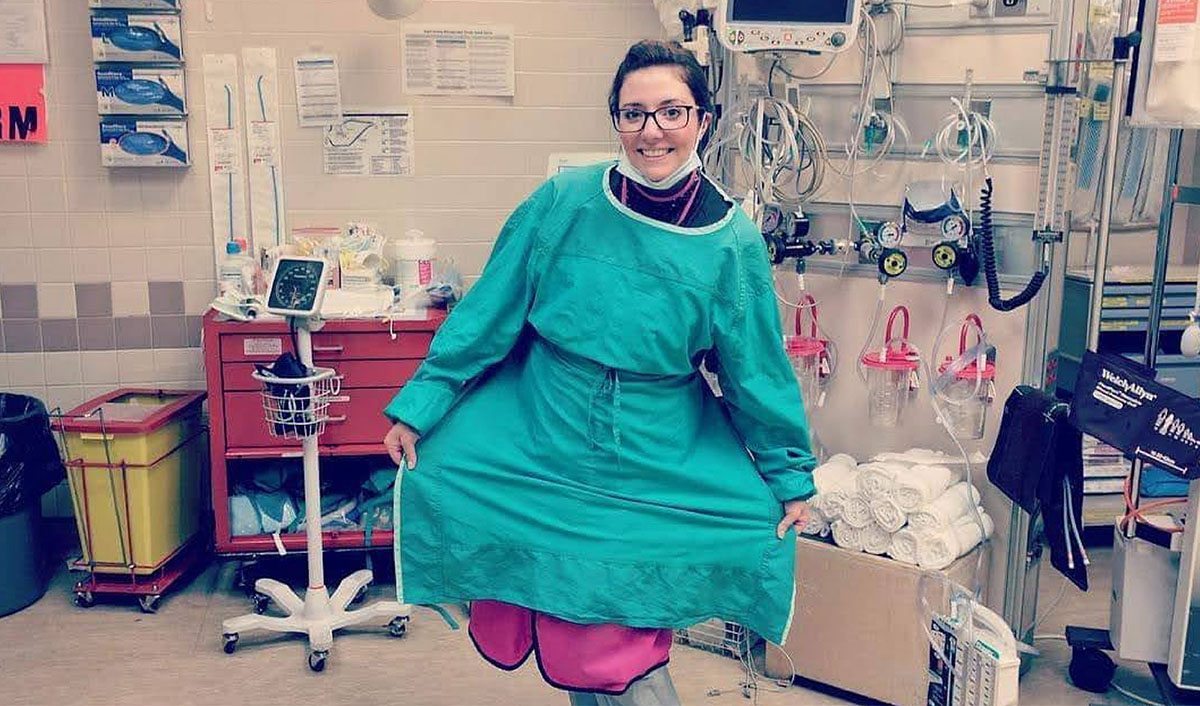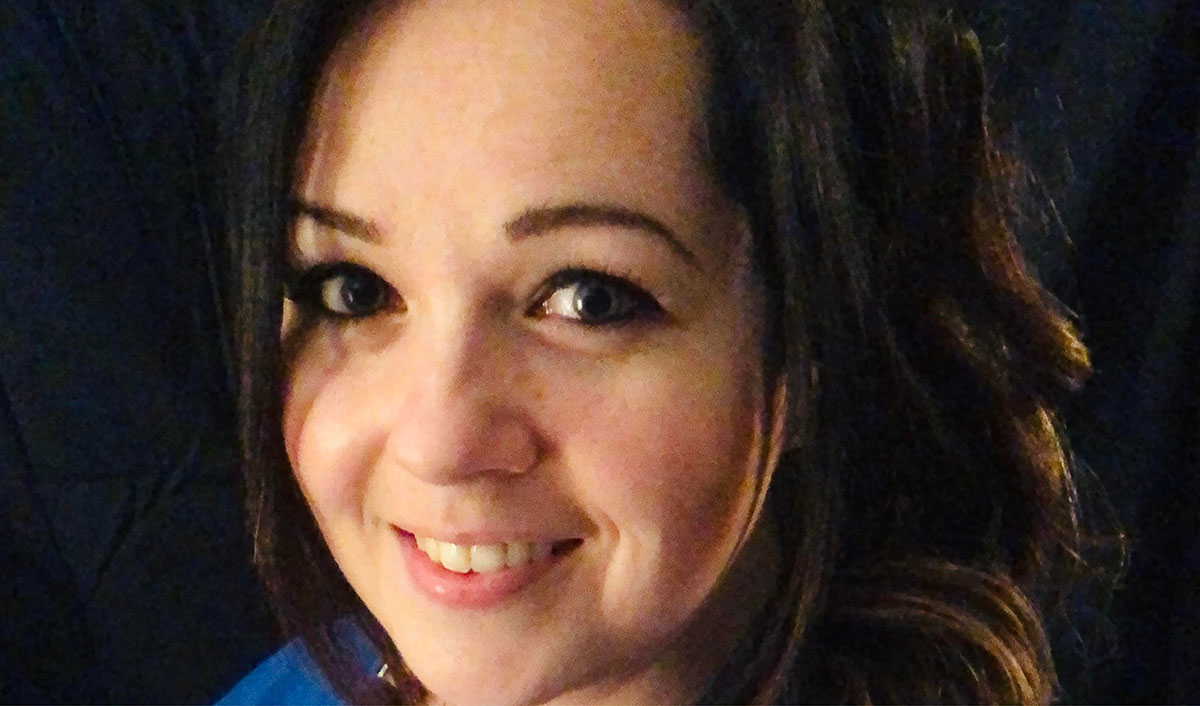With National Nursing Week upon us, and collective gratitude for their continual amazing work in year two of the pandemic, we look back at some shining stars from Mount Royal’s Bachelor of Nursing program.
We re-introduce you to Rebecca, Stefan, Michelle and Melissa — four remarkable alumni from Mount Royal’s School of Nursing and Midwifery who touch thousands of lives each year.

Rebecca Morante is a nursing supervisor in the emergency department at Medecins Sans Frontieres.
Rebecca Morante (Bachelor of Nursing, 2004)
To say that Rebecca Morante is fully entrenched in the Mount Royal community is an understatement. A regular fixture on campus since childhood (as the daughter of a Mount Royal instructor), Morante completed her Bachelor of Nursing in 2004. She has been a frequent mentor for MRU nursing students and was nominated for a 2020 Alumni Achievement Award.
Morante is currently working with Medecins Sans Frontieres at a children’s hospital in Sierra Leone. As a nursing supervisor in the emergency department, Morante’s days are spent triaging, assessing, treating and sometimes resuscitating children under the age of five who end up in emergency.
Having always been drawn to caring for the vulnerable, Morante knew early on that she wanted to serve in the humanitarian sector. In her current role, Morante and her colleagues are having a direct impact on reducing the high mortality rates in Sierra Leone.
Q: How has COVID-19 impacted your daily routine?
A: In a country endemic to malaria falciparum, Lassa fever and where Ebola devastated the population, the threat of COVID-19 was taken seriously and all necessary precautionary measures were put into place and adhered to.
The day starts by putting on a mask to travel to work. The team then has their temperatures assessed, we wash our hands, change into our uniforms and replace the cloth mask with a surgical mask. Each patient is screened for COVID-19 and each caregiver is expected to wear a mask. To provide certain patient care measures proper personal protective equipment is worn; face shields, respirators, gowns or aprons. We have limited opportunities for testing, which means among ourselves every ache, cough, throat tickle and headache is cause for concern. But mostly, our daily routine remains focused on providing high quality evidence-based patient care.
Q: What is challenging about being a nurse/midwife?
A: I’ve worked in many health-care systems around the world and nurses face demands no matter where they are located. Sometimes the challenge is just that you are not a doctor, somehow that makes one seem less capable, less intelligent or less worthy of having an opinion simply for choosing a different career path. Sometimes the challenge is the workload or resources to manage the load. Other times the challenge is simultaneously doing the work needed to save a patient’s life while still calmly explaining and comforting their loved ones.
Nursing is a world full of trying to balance knowledge, skill, emotion and reflexes within a team hoping for the best outcomes for those we care for. I’m honoured to be part of a worldwide team of diverse individuals working towards a common cause; improving the health outcomes of others. It truly is a distinction.

Alumnus Stefan Makwana (left) with his Police and Crisis Team partner, Natasha French (right), who is also an alum from Mount Royal's Criminology program
Stefan Makwana (Bachelor of Nursing, 2007)
For Stefan Makwana, an alumnus of the 2007 Bachelor of Nursing program, nursing is a highly rewarding career with seemingly endless opportunities. He loves the fact that, “no two days are ever alike and every day presents a new and exciting challenge.”
For the past ten years, Makwana has worked in addictions and mental health with the Police and Crisis Team, a partnership between Alberta Health Services and the Calgary Police Service. Working with a police partner, Makwana is a case manager, advocating for clients experiencing severe mental health and addiction issues and helping them obtain necessities such as food, clothing and shelter. One day he may be involved in crisis intervention, the next he may be accompanying a client to a medical appointment or housing interview. Making the rounds to emergency shelters, hospitals, urgent care centres, police stations and community agencies is all in a day’s work.
Q: How has COVID-19 impacted your daily routine?
A: COVID-19 has had significant impacts on the mental health of my clients. Clients have become increasingly isolated, stressed and financially stretched. Many community agencies that clients depend on are short-staffed or have limited hours, making accessing supports difficult. Some agencies that had previously provided food hampers have closed, meaning clients are going hungry more often. Many shelters are operating at reduced capacity and more clients are sleeping rough outside, which can have severe consequences during the winter months. Meeting with clients has become increasingly difficult since they have been displaced from shelters. Many clients do not have phones to initiate contact, and COVID screening requirements limit accessible indoor spaces. All of this has resulted in more client interactions requiring crisis intervention and more frequent client interactions with emergency services.
Q: Where do you see yourself in ten years?
A: In 10 years, I will have completed my master's degree. I would like to be working part-time as a nurse practitioner in a rural setting and filling the rest of my time teaching at a post-secondary institution ... when I'm not fly fishing, that is.

Michelle Thorgeirson is a registered nurse at the Level I Trauma Centre Emergency Department.
Michelle Thorgeirson (Bachelor of Nursing, 2014)
An alumna from the Bachelor of Nursing class of 2014, Michelle Thorgeirson currently works as a registered nurse (RN) at the Level I Trauma Centre Emergency Department in Calgary. In this high-paced environment, Thorgeirson is responsible for assessing, treating, educating, advocating and caring for patients of all ages during critical vulnerable moments in their lives. Thorgeirson loves being a nurse, stating, “I am so lucky to be able to do what I do each and every day.”
In Thorgeirson’s last year of high school, she was working a lifeguard shift at a local pool when a man went into cardiac arrest. She initiated CPR and was promptly joined by an RN who was on her day off, but was in the vicinity. Thorgeirson was struck by how collected, knowledgeable, and most of all, compassionate the RN was. The man was eventually taken to the hospital, and six weeks later returned to the pool with his two young children. Between witnessing this RN in action, and having the man’s youngest child whisper to her, “Thank you for saving my Daddy’s life,” this experience cemented her decision to enter the nursing field.
Q: What excites you about working in health care?
A: Health care in its entirety is incredibly exciting. Science, medicine and technology are rapidly advancing. These advancements allow the scope of nursing to progress and we are able to expand on our standards of care. As health-care professionals, we work collaboratively as a multidisciplinary team, ensuring we provide our patients with the most ethical, safest and effective evidence-based care at the bedside in order to improve patient outcomes. With these continuous advancements, nurses are able to consistently encompass the person, environment, nursing and health in their practice and broaden health care innovation. As a nursing educator, I am so lucky to be able to see these advancements at the foundational level of learning with nursing students as they develop their own nursing philosophy, skill sets, holistic approach and passion for health care as practices continue to evolve.
Q: Where do you see yourself in ten years?
A: At the present time, I have almost completed my Master’s of Nursing with a focus on nursing education at Athabasca University. In ten years, I hope to have achieved my PhD in nursing and be a full-time nursing educator enlightening the future members of the nursing community and those who currently reside within it as a strong ambassador of nursing, teamwork, evidence-based practice and experiential learning.

Melissa Ball works four different nursing positions — two in acute care units and two in public health.
Melissa Ball (Bachelor of Nursing, 2019)
A mother of four, Melissa Ball was drawn to nursing after spending frequent time in the hospital with her second child due to significant health issues. “I wanted to become the best care provider for her that I could be, so I chose nursing.”
Ball, who graduated from the Bachelor of Nursing program last year, balances not one, but four nursing positions — two in acute care units and two in public health. A typical day for Ball involves waking up at 5 a.m. to prepare care plans and organize her day prior to her shift. She then spends anywhere from eight to 12hours on her feet, before heading home to join her family for dinner, help with homework and prepare lunches for the next day.
Q: How has COVID-19 impacted your daily routine?
A: Doors of opportunity were opened in nursing for those of us willing to take on the challenge. The best part was no matter what experience you had, be it 20 years or two months, all of us suddenly ended up being on the same playing field learning to navigate the challenges presented to us. I have ended up working far more than I ever intended to with having four children — three of whom require homeschooling with our new public health orders — where I have to balance the need to both be present at home but also on the front lines helping my team members carry the ever-changing workloads.
Q: Share a special memory of MRU
A: It was day one of nursing school and Professor Kerri Alderson said, “Welcome to your first day as a nurse.” I worked so hard to get into nursing school and that welcome made me feel like I had made it. From that point on, it was just a matter of earning that RN pin as MRU set us up to feel like nurses in the very first year. We are so lucky to have such a diverse and intricate clinical program at MRU. It is because of that I was able to adapt to working in various nursing roles so quickly.
Mount Royal has been educating nurses since 1967. This year Mount Royal worked closely with the College and Association of Registered Nurses of Alberta to fast-track those students into practice who were in their last year, and in doing so assisted in providing much-needed support during the pandemic.